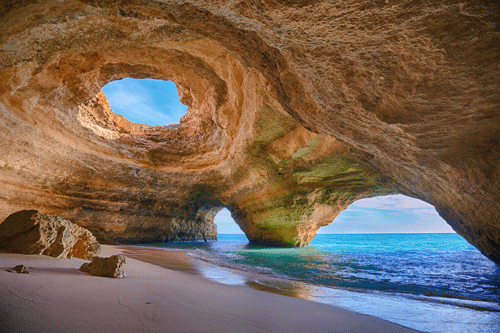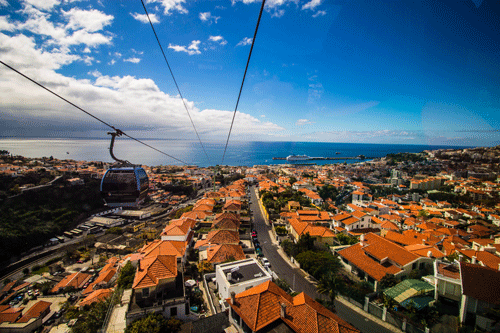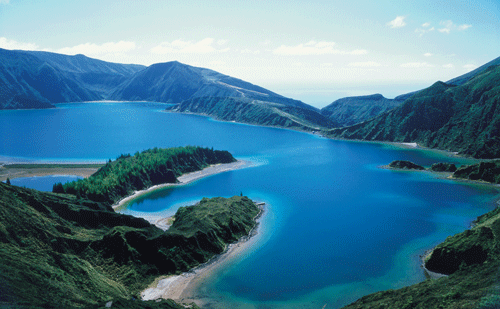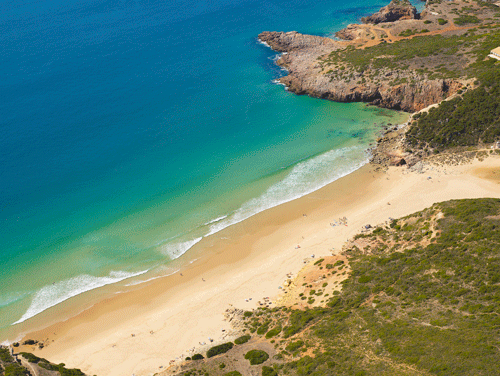Portugal is the perfect holiday destination year-round, with its mild climate, 3,000 hours of sunshine per year and more than 500 miles of splendid beaches, plus superb cuisine, fine wines and hospitable people.
Can British travellers go to Portugal?

From December 1, all passengers to mainland Portugal must show proof of a negative Covid-19 test, even if they have been fully vaccinated. This can be a negative PCR test, taken within 72 hours of departure, or a negative antigen test, taken within 48 hours of departure.
Children aged 11 and under are exempt from testing requirements.
All visitors must fill out a form within four days of arriving in Portugal, which can be found here.
Those travelling to Madeira must fill out a questionnaire, which can be found here, and show proof of their Covid-19 vaccinations. Those who don’t have a vaccination certification must show proof of a negative PCR test taken within 72 hours of departure and upload the negative result to the passenger questionnaire. They can also take a free test on arrival. These rules do not apply to those age 11 and under.
Travellers going to the Azores must show their vaccination certificate or show proof of a negative PCR test taken within 72 hours of departure, or a negative antigen test taken within 48 hours of arrival. A PCR test can also be taken on arrival if either of these conditions aren’t met. Those aged 11 and under are exempt. Everyone, including children, should also fill out a passenger questionnaire, which can be found here.
There is specific information on safety measures in Madeira here and the Azores here.
As of January 9, fully vaccinated travellers returning to the UK must take a Covid-19 test, which can be a lateral flow test, on or before day two, and fill out a passenger locator form.
Travellers returning to the UK who aren’t fully vaccinated must fill out a passenger locator form and take a Covid-19 test before arriving, as well as PCR tests on day two and day eight, and quarantine for 10 days.
What can travellers expect on arrival in Portugal?
Mainland Portugal
Passengers over the age of 12 now need to show a negative Covid-19 test, either PCR within 72 hours of departure, or antigen within 48 hours of departure, for travel to mainland Portugal, regardless of vaccination status.

Children aged 11 and under are exempt from testing requirements.
All passengers travelling to airports in mainland Portugal (Faro, Lisbon and Porto) will be required to show they have filled in a Passenger Locator Card (PLC) from the Portuguese Health Authority. The digital form is available here.
Passengers will be sent a link to the form by their airline at the time of booking and reminded at various stages before embarking the aircraft. Once they have completed the form online, they will receive an electronic receipt which they will need to show to airline staff at the gate prior to boarding, either as a printed receipt or on a mobile device.
Travellers going to the archipelagos of Madeira and the Azores must comply with different entry requirements.
Madeira
Tourists are now eligible for direct entry to Madeira without the need for testing if they can provide an EU Digital Covid Certification or proof of Covid-19 recovery within 180 days. The NHS Covid pass is also accepted.
To be eligible, tourists who fall under these new conditions must prove their status through one of two documents:
1) Document certifying vaccination against Covid-19. The certificate should include the following information: name, date of birth, NHS number, vaccine type and dates of both doses.
2) Proof of Covid-19 recovery in the last 180 days, validated by the respective country of origin and state the name, date of birth, health number, type and date of the test and the explicit mention “recovered”.
Any of the above documents in English must be submitted to the app madeirasafe.com before the trip is made.
If passengers travelling from the UK cannot prove the above requirements, they must show proof of a negative PCR test carried out within 72 hours before boarding. Or they can take a test for free on arrival. Passengers aged 11 and under are exempt.
You can find more information about entry procedures to Madeira here.
The wellbeing and protection of citizens and tourists visiting the archipelago of Madeira continues to be the priority.

Azores
All passengers travelling to the Azores have to show proof of a negative Covid-19 RT-PCR test either on paper or in digital format taken 72 hours before boarding. They can also take an antigen test 48 hours before boarding. This measure does not apply to children aged 11 and under.
Tourists are also eligible for direct entry to the Azores without a test if they can show a valid or show a valid EU Digital Covid Certificate. The NHS Covid pass is accepted. Travellers can also provide proof of Covid-19 recovery within 180 days, validated by the respective country of origin. This should include the following information: name, date of birth, type and date of the test and the explicit mention that the person has ‘recovered’. The declaration should be signed by the doctor and should also include their professional details.
Those who are not fully vaccinated but arrive in the Azores by air or sea with a negative Covid-19 test can proceed to their accommodation and enjoy their holiday.
International travellers who have not been vaccinated arriving to the Azores by air or sea without a negative Covid-19 test must take one on arrival. The test is free and the traveller will have to wait for the result in isolation at their accommodation. The results can take between 12-24 hours.
For smooth entry into the Azores, passengers must fill out the Questionnaire for Risk Assessment and Early Detection of SARS-CoV-2 and submit the result of the test within 72 hours before the start of their trip. The questionnaire can be found here.
Find out more about arrival procedures in the Azores here.
Travelling with children
All children over the age of 10 must wear a face mask while travelling.
Are Portugal’s cruise ports open?
 Portugal’s cruise ports are open for the embarkation and disembarkation of tourism cruises. The same rules as for air traffic apply. Passengers must show proof of an RT-PCR Covid-19 negative test carried out within 72 hours beforehand.
Portugal’s cruise ports are open for the embarkation and disembarkation of tourism cruises. The same rules as for air traffic apply. Passengers must show proof of an RT-PCR Covid-19 negative test carried out within 72 hours beforehand.
What safety measures are in place in Portugal?
The Portuguese government has released a four-step roadmap out of some of the restrictions currently in place across Portugal. For more information, click here.
There are widespread safety measures in place in Portugal and Turismo de Portugal has developed a Clean & Safe stamp in line with WTTC measures, for all tourism venues, including hotels, local accommodation, tour operators and restaurants.
You must wear a face mask on public transport, in concert halls and events, health establishments and in large commercial spaces. From December 1, wearing a mask will become mandatory in enclosed indoor spaces.
Capacity limits have now been lifted in restaurants and cafes, and for cultural and private events.
It is necessary to show a Covid pass for entering bars and clubs, major cultural and sporting events, visits to health facilities and for air and sea travel, and, from December 1, will also be needed to enter restaurants, cinemas and hotels.
The situation in Portugal changes, and the latest information about the rules in each council area can be found here.
Wine in Portugal
Travel Weekly, in association with Visit Portugal, has produced a selling guide about wine tourism in Portugal. Click here to read the guide.

PICTURES: GoodShoot; RCL-RuiCunha; Bruno Carlos; Turismo de Portugal; AP Madeira; Hélio Ramos
Last updated January 7, 2022
